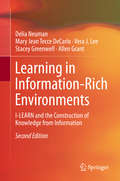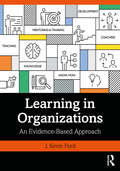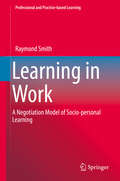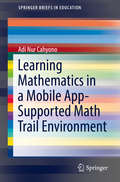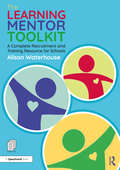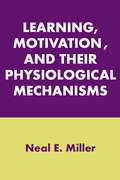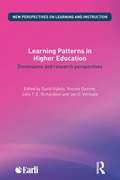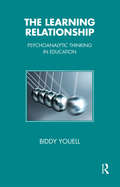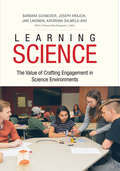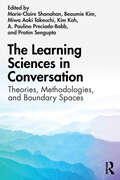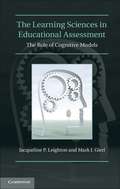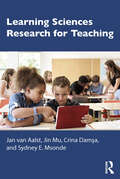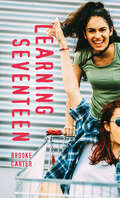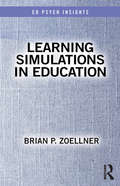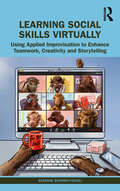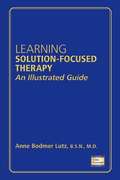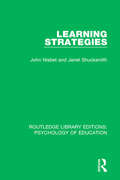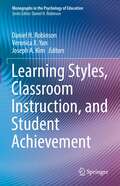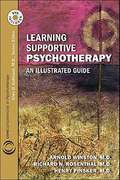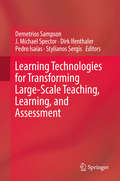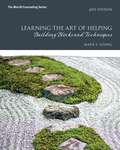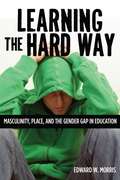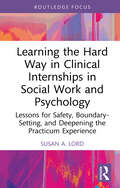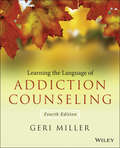- Table View
- List View
Learning in Information-Rich Environments: I-LEARN and the Construction of Knowledge from Information
by Delia Neuman Mary Jean Tecce DeCarlo Vera J. Lee Stacey Greenwell Allen GrantThe amount and range of information available to today’s students—and indeed to all learners—is unprecedented. If the characteristics of “the information age” demand new conceptions of commerce, national security, and publishing—among other things—it is logical to assume that they carry implications for education as well. Little has been written, however, about how the specific affordances of these technologies—and the kinds of information they allow students to access and create—relate to the central purpose of education: learning. What does “learning” mean in an information-rich environment? What are its characteristics? What kinds of tasks should it involve? What concepts, strategies, attitudes, and skills do educators and students need to master if they are to learn effectively and efficiently in such an environment? How can researchers, theorists, and practitioners foster the well-founded and widespread development of such key elements of the learning process? This second edition continues these discussions and suggests some tentative answers. Drawing primarily from research and theory in three distinct but related fields—learning theory, instructional systems design, and information studies—it presents a way to think about learning that responds directly to the actualities of a world brimming with information. The second edition also includes insights from digital and critical literacies and provides a combination of an updated research-and-theory base and a collection of instructional scenarios for helping teachers and librarians implement each step of the I-LEARN model. The book could be used in courses in teacher preparation, academic-librarian preparation, and school-librarian preparation.
Learning in Organizations: An Evidence-Based Approach
by J. Kevin FordLearning in Organizations: An Evidence-Based Approach examines the variety of systematic approaches and strategies for learning and development used in the workplace through the implementation of formal training, guided instruction, developmental job experiences, and self-directed learning. The hallmark of Learning in Organizations is an emphasis on research evidence of what is and is not known about learning and learning strategies and the translation of that evidence to guide best practices in workplace learning and development. The book features evidence on learning principles, new learning technologies, and strategies for developing individual, team, and leadership capabilities. The content of the chapters is enhanced by the inclusion of key learning goals for each chapter, case studies, chapter summaries, best practice recommendations, and a hands-on project for use in the classroom. Learning in Organizations provides researchers with a detailed investigation of learning practices to help drive future research. For learning practitioners, research evidence is translated into best practices that can be applied to enhance workplace learning and development. For undergraduate and graduate students, the book provides an up-to-date review of the key concepts and ways of thinking about and studying learning in the workplace.
Learning in Work: A Negotiation Model Of Socio-personal Learning (Professional and Practice-based Learning #23)
by Raymond SmithThis book explores and progresses the concept of negotiation as a means of describing and explaining individuals’ learning in work. It challenges the undertheorised and generic use of the concept in contemporary work-learning research where the concept of negotiation is most often deployed as a taken for granted synonym for interaction, co-participation and collaboration and, hence, used to unproblematically account for workers’ learning as engagement in social activity. Through a focus on workers’ personal practice and based on extensive longitudinal empirical research, the book advances a conceptual framework, The Three Dimensions of Negotiation, to propose a more rigorous and work-learning specific understanding of the concept of negotiation. This framework enables workers’ personal work practices and their contributions to the personal, organisational and occupational changes that evidence learning to be viewed as negotiations enacted and managed, within contexts that are in turn sets of premediate and concurrent negotiations that frame the transformations on and from which on-going negotiations of learning and practice ensue. The book does not seek to supplant understandings of the rich and valuable concept of negotiation. Rather, it seeks to develop and promote a more explicit use of the concept as a socio-personal learning concept at the same time as it opens alternative perspectives on its deployment as a metaphor for individual’s learning in work.
Learning Mathematics in a Mobile App-Supported Math Trail Environment (SpringerBriefs in Education)
by Adi Nur CahyonoThis brief presents the results of a study on the development of the mobile app-supported math trail program for learning mathematics. This study is a part of the MathCityMap-Project, a project of the MATIS I Team from IDMI Goethe-Universität Frankfurt, Germany, that comprises math trails around the city that are supported by the use of GPS-enabled mobile phone technology. The project offers an activity that is designed to support students in constructing their own mathematical knowledge by solving the prepared mathematical tasks on the math trail and interacting with the environment, including the digital environment. The brief focuses specifically on the development of a model for a mobile app-supported math trail programme and the implementation of this programme in Indonesia. It offers both an empirical exploration of its implementation as well as critical assessment of students’ motivation in mathematics, their own performance, as well as teachers’ mathematics beliefs. It concludes with a future-forward perspective by recommending strategies for implementation in schools, among the general public of the existing math trails (including its supporting tool). It also discusses strategies for developing and designing new trails and suggests further research in other geographical regions and contexts for continued project development and implementation. Learning Mathematics in a Mobile App-Supported Math Trail Environment articulates an innovative and exciting future for integrating real mathematical tasks and geographic and digital environment into effective mathematics education.
The Learning Mentor Toolkit: A Complete Recruitment and Training Resource for Schools
by Alison WaterhouseThe Learning Mentor Toolkit provides all of the resources necessary to recruit, train and supervise adult learning mentors looking to support children and young people within the school environment. Packed full of information, this book details all of the necessary training and uncovers how best to ensure that supervision meets the needs of the volunteers, the children and the school. Developed to enable a lead member of staff to find, co-create and train a range of adults from the school community and use these Volunteer Learning Mentors to support children and young people within their environment, the support offered is linked to the five key areas that create positive foundations for mental health and wellbeing: • the ability to create and develop positive relationships • emotional literacy • self-awareness • how our brains can affect learning and behaviour • skills for learning Full of practical advice and resources, this book is the ideal resource for any wellbeing lead or senior leadership team looking to recruit and train learning mentors within their school.
Learning, Motivation, and Their Physiological Mechanisms
by Neal E. MillerNeal E. Miller's pioneering work in experimental psychology has earned him worldwide respect. This second in a two-volume collection of his work brings together forty-three of Miller's most important and representative essays on learning, motivation, and their physiological mechanisms. They were selected on the basis of their current relevance and their historical significance at the time they were published. In order to emphasize the main themes, essays on a given topic have been grouped together.Learning, Motivation, and Their Physiological Mechanisms begins when the author first discovered the thrill of designing and executing experiments to get clear-cut answers concerning the behavior of children and of rats. The first study was one of the earliest ones on the behavioral effects of the recently synthesized male hormone, testosterone. The second was one of the earliest studies demonstrating the value of using a variety of behavioral techniques to investigate the motivational effects of a physiological intervention. The next studies investigated the satisfying and rewarding effects of food or water in the stomach versus in the mouth and the thirst-inducing and reducing effects of hyper- and hypotonic solutions, respectively, injected into the brain. The last study describes a technique devised for extending the analysis of the mechanism of hunger to the effects of humoral factors in the blood.The study is completed with an examination of trial-and-error learning that was motivated by direct electrical stimulation of the brain and rewarded by the termination of such stimulation. Other studies show that the stimulation via such electrodes not only elicits eating, but also has the principal motivational characteristics of normal hunger. The conclusion deals with a series of experiments that overthrows strong traditional beliefs by proving that glandular and visceral responses mediated by the autonomic nervous system are subject to instrumental learning, which can be
Learning Patterns in Higher Education: Dimensions and research perspectives (New Perspectives on Learning and Instruction)
by David Gijbels Donche Vincent John T. E. Richardson Jan D. VermuntLearning Patterns in Higher Education brings together a cutting edge international team of contributors to critically review our current understanding of how students and adults learn, how differences and changes in the way students learn can be measured in a valid and reliable way, and how the quality of student learning may be enhanced. There is substantial evidence that students in higher education have a characteristic way of learning, sometimes called their learning orientation (Biggs 1988), learning style (Evans et al. 2010) or learning pattern (Vermunt and Vermetten 2004). However, recent research in the field of student learning has resulted in multi-faceted and sometimes contradictory results which may reflect conceptual differences and differences in measurement of student learning in each of the studies. This book deals with the need for further clarification of how students learn in higher education in the 21st century and to what extent the measurements often used in learning pattern studies are still up to date or can be advanced with present methodological and statistical insights to capture the most important differences and changes in student learning. The contributions in the book are organized in two parts: a first conceptual and psychological part in which the dimensions of student learning in the 21st century are discussed and a second empirical part in which questions related to how students’ learning can be measured and how it develops are considered. Areas covered include: Cultural influences on learning patterns Predicting learning outcomes Student centred learning environments and self-directed learning Mathematics learning This indispensable book covers multiple conceptual perspectives on how learning patterns can be described and effects and developments can be measured, and will not only be helpful for ‘learning researchers’ as such but also for educational researchers from the broad domain of educational psychology, motivation psychology and instructional sciences, who are interested in student motivation, self-regulated learning, effectiveness of innovative learning environments, as well as assessment and evaluation of student characteristics and learning process variables.
The Learning Relationship: Psychoanalytic Thinking in Education (Tavistock Clinic Series)
by Biddy YouellThis book offers a psychoanalytic perspective on learning and teaching and on many of the issues which preoccupy those who work in educational the origins of learning in children’s early relationships and at factors which help and hinder the educational process in later childhood and adolescence. Amongst the topics addressed in the book are the significance of play and playfulness, the impact of change, separation, times of transition, bereavement, bullying and racism. The author has aimed to set well-established psychoanalytic ideas about lear of current educational practice and to look at the teacher’s experience alongside that of the students.
Learning Science: The Value of Crafting Engagement in Science Environments
by Barbara Schneider Joseph Krajcik Jari LavonenAn innovative, internationally developed system to help advance science learning and instruction for high school students This book tells the story of a $3.6 million research project funded by the National Science Foundation aimed at increasing scientific literacy and addressing global concerns of declining science engagement. Studying dozens of classrooms across the United States and Finland, this international team combines large-scale studies with intensive interviews from teachers and students to examine how to transform science education. Written for teachers, parents, policymakers, and researchers, this book offers solutions for matching science learning and instruction with newly recommended twenty-first-century standards.
The Learning Sciences in Conversation: Theories, Methodologies, and Boundary Spaces
by Marie-Claire Shanahan Beaumie Kim Miwa Aoki Takeuchi Kim Koh A. Paulino Preciado-Babb Pratim SenguptaThe Learning Sciences in Conversation explores the unique pluralities, complex networks, and distinct approaches of the learning scientists of today. Focused on four key scholarly areas – transdisciplinarity, design, cognition, and technology – this cutting-edge volume draws on empirical and theoretical foundations to illustrate the directions, perspectives, methods, and questions that continue to define this evolving field. Contributions by researchers are put in dialogue with one another, offering an exemplary analysis of a field that synthesizes, in situ, various scholarly traditions and orientations to create a critical and heterogenous understanding of learning.
The Learning Sciences in Conversation: Theories, Methodologies, and Boundary Spaces
by Marie-Claire Shanahan Beaumie Kim Miwa Aoki Takeuchi Kim Koh A. Paulino Preciado-Babb Pratim SenguptaThe Learning Sciences in Conversation explores the unique pluralities, complex networks, and distinct approaches of the learning scientists of today. Focused on four key scholarly areas – transdisciplinarity, design, cognition, and technology – this cutting-edge volume draws on empirical and theoretical foundations to illustrate the directions, perspectives, methods, and questions that continue to define this evolving field. Contributions by researchers are put in dialogue with one another, offering an exemplary analysis of a field that synthesizes, in situ, various scholarly traditions and orientations to create a critical and heterogenous understanding of learning.
The Learning Sciences in Educational Assessment
by Mark J. Gierl Jacqueline P. LeightonThere is mounting hope in the United States that federal legislation in the form of No Child Left Behind will improve educational outcomes. As titanic as the challenge appears to be, however, the solution could be at our fingertips. This volume identifies visual types of cognitive models in reading, science and mathematics for researchers, test developers, school administrators, policy makers and teachers. In the process of identifying these cognitive models, the book also explores methodological or translation issues to consider as decisions are made about how to generate psychologically informative and psychometrically viable large-scale assessments based on the learning sciences. Initiatives to overhaul educational systems in disrepair may begin with national policies, but the success of these policies will hinge on how well stakeholders begin to rethink what is possible with a keystone of the educational system: large-scale assessment.
Learning Sciences Research for Teaching
by Jan van Aalst Jin Mu Crina Damşa Sydney E. MsondeLearning Sciences Research for Teaching provides educators with a fresh understanding of the use and implications of learning sciences scholarship on their studies and professional preparation. A highly interdisciplinary field, the learning sciences has been expressly focused on the advancement of teaching and learning in today’s schools. This introductory yet cutting-edge resource supports graduate students of teaching, leadership, curriculum, and learning design in research methodology courses as they engage with and evaluate research claims; integrate common methods; and understand experimental, case-based, ethnographic, and design-based research studies. Spanning the learning science’s state-of-the-art approaches, achievements, and developments, the book includes robust, accessible coverage of topics such as professional development, quantitative and qualitative data, learning analytics, validity and integrity, and more.
Learning Seventeen (Orca Soundings)
by Brooke CarterNew Hope Academy, or, as seventeen-year-old Jane Learning likes to call it, No Hope, is a Baptist reform school where Jane is currently being held captive. Of course, smart, sarcastic Jane has no interest in reforming, failing to see any benefit to pretending to play well with others. But then Hannah shows up, a gorgeous bad girl with fiery hair and an even stormier disposition. She shows Jane how to live a full and fulfilling life even when the world tells you you're wrong, and how to believe in a future outside the "prison" walls. Jane soon learns, though, that Hannah is quietly battling some demons of her own.
Learning Simulations in Education (Ed Psych Insights)
by Brian P. ZoellnerTechnology-enabled simulations are increasingly used for students in K-12 education and have the potential to improve teaching and learning across domains. Across five chapters, this book explores the psychological foundation of simulation use in instruction, guiding readers through individual differences among learners and contexts while addressing theory, pedagogy, cognitive processes, and more. This concise volume is designed for any education course that includes simulations in the curriculum and will be indispensable for student researchers and both pre- and in-service teachers alike.
Learning Social Skills Virtually: Using Applied Improvisation to Enhance Teamwork, Creativity and Storytelling
by Susanne Schinko-FischliDigital workshops and meetings have established a firm foothold in our everyday lives and will continue to be part of the new professional normal, whether we like it or not. This book demonstrates how workshops and meetings held online can be made just as interactive, varied and enjoyable as face-to-face events. The methods from improvisational theatre are surprisingly well suited for online use and bring the liveliness, playful levity and co-creativity that are often lacking in digital lessons and meetings. Applied improvisation is an experience-oriented method that is suitable for developing all soft skills – online and offline. Alongside brief introductions to the most relevant themes, the book contains numerous practical exercises in the areas of teamwork, co-creativity, storytelling, status and appearance, with examples of how to implement them online. This book, written in the climate of the COVID-19 pandemic, is important reading for everyone – coaches, professionals and executives – looking for new impulses for their digital workshops and meetings, and who would like to expand the variety of their online methods. It offers new perspectives on many soft skills topics and supports interactive, engaging, lively and profitable online learning.
Learning Solution-Focused Therapy: An Illustrated Guide
by Anne Bodmer LutzSolution-focused therapy is an evidenced-based practice that focuses on creating conversations that build solutions, rather than solve problems. Learning Solution-Focused Therapy: An Illustrated Guide teaches readers how to practice and become competent in conducting solution-focused therapy, an area of growing interest as the emphasis on brief therapy increases. Critical to the book s learning strategy is the generous use of case illustrations that are detailed, rich, and instructive without being overly didactic. The case approach provides an effective means for seeing concepts put into practice, and since medicine is becoming more patient-focused, the solution-focused therapy model is highly relevant. Organized to show how a solution-focused interview is conducted, the book presents the basic model and goes on to apply this model in psychopharmacology, addiction, supervision and consultation. Each chapter combines readings, solution-focused questions, case illustrations, learning exercises and video demonstrations (available online), which together constitute a comprehensive course in this therapeutic modality. Moreover, the author s conversational writing style makes the tenets and techniques accessible and interesting to a wide variety of clinicians. Learning Solution-Focused Therapy: An Illustrated Guide will appeal to clinicians who wish to enhance their skills and support their patients growth in a positive way.
Learning Strategies (Routledge Library Editions: Psychology of Education)
by John Nisbet Janet ShucksmithOriginally published in 1986, designed for teachers and those concerned with the education of primary and secondary school pupils, Learning Strategies presented a new approach to ‘learning to learn’. Its aim was to encourage teachers to start thinking about different approaches to harnessing the potential of young learners. It was also relevant to adult learners, and to those who teach them. Thus, although about learning, the book is also very much about teaching. Learning Strategies presents a critical view of the study skills courses offered in schools at the time, and assesses in non-technical language what contributions could be made to the learning debate by recent developments in cognitive psychology. The traditional curriculum concentrated on ‘information’ and developing skills in reading, writing, mathematics and specialist subjects, while the more general strategies of how to learn, to solve problems, and to select appropriate methods of working, were too often neglected. Learning to learn involves strategies like planning ahead, monitoring one’s performance, checking and self-testing. Strategies like these are taught in schools, but children do not learn to apply them beyond specific applications in narrowly defined tasks. The book examines the broader notion of learning strategies, and the means by which we can control and regulate our use of skills in learning. It also shows how these ideas can be translated into classroom practice. The final chapter reviews the place of learning strategies in the curriculum.
Learning Styles, Classroom Instruction, and Student Achievement (Monographs in the Psychology of Education)
by Daniel H. Robinson Veronica X. Yan Joseph A. KimThe book examines the history of learning styles, including their widespread acceptance and endorsement in educational settings. In addition, it explores both the support of and opposition to learning styles by academics. The book discusses cases for and against learning styles and offers a systematic review of empirical evidence. It describes consequences of promoting learning styles in the classroom and offers insights into future directions in research and practice.The book offers a critical examination that adds to the broader discussion of what is truthful and what is fake news in education.Key areas of coverage include:History of learning styles.Widespread belief in and uses of learning styles.Review of recent learning styles coverage in academic journals.The case for learning styles.The case against learning styles.Consequences associated with using learning styles. Learning Styles, Classroom Instruction, and Student Achievement is an essential resource for researchers, professors, and graduate students as well as teachers and educational professionals in such varied fields as clinical child and school psychology, educational psychology, social work, public health, teaching and teacher education, and educational practice and policy.
Learning Supportive Psychotherapy: An Illustrated Guide
by Arnold Winston Richard N. Rosenthal Henry Pinsker Glen O. GabbardMastering the art of supportive psychotherapy demands years of training and experience -- and Learning Supportive Psychotherapy: An Illustrated Guide paves the way. This book, along with the accompanying DVD, serves as a trustworthy guide to mastering the rudiments of supportive psychotherapy from the initial interview through the therapeutic progression to the very last session. The authors, preeminent figures in psychiatry, describe the basic principles and objectives of supportive psychotherapy, with emphasis on the critical importance of the therapeutic relationship and how to develop a positive therapeutic alliance. They have written an extremely accessible text that provides practical hands-on instruction to beginning psychotherapists, social workers, psychiatric nurses, and others who require the fundamentals of psychotherapeutic patient care. Supportive psychotherapy has been recognized as a core competency, and readers seeking the requisite skills will find an advantage in this volume's beneficial features: #149; Insightful perspective on the origins and development of supportive psychotherapy, locating it on the psychodynamic therapy spectrum, and distinguishing it from the expressive psychotherapies in terms of objectives, process, and outcomes#149; Expert instruction on conducting a thorough assessment and evaluation of a patient, with emphasis on techniques for conducting a comprehensive initial interview, exploring the patient's manifesting problems, taking an accurate patient history, eliciting useful information, and identifying supportive measures -- all of which are crucial to establishing a therapeutic relationship#149; Specialized focus on useful techniques, including alliance building, esteem building, encouragement, promoting adaptive behaviors, anticipatory guidance, reducing and preventing anxiety, naming the problem, rationalizing and reframing, expanding awareness, clarification, interpretation, and much more#149; Critical information on how to intervene in a crisis to facilitate the patient's personal growth rather than physical and psychological deterioration#149; Significant clinical illustrations, vignettes, and case studies to help the reader make connections between theoretical concepts and real-world applications. This text follows one of the three formats now required for psychiatry residency training by the Accreditation Council for Graduate Medical Education (ACGME) and provides newly credentialed psychiatrists with the basic tools needed to treat the broad range of patients they encounter. Like the other books in the Core Competencies series, it is a valuable adjunct to the traditional methods of psychotherapy education and an indispensable resource for the profession.
Learning Technologies for Transforming Large-Scale Teaching, Learning, and Assessment
by Dirk Ifenthaler J. Michael Spector Pedro Isaías Demetrios Sampson Stylianos SergisThis volume provides a contemporary glance at the drastically expanding field of delivering large-scale education to unprecedented numbers of learners. It compiles papers presented at the CELDA (Cognition and Exploratory Learning in the Digital Age) conference, which has a goal of continuing to address these challenges and promote the effective use of new tools and technologies to support teaching, learning and assessment. Given the emerging global trend to exploit the potential of existing digital technologies to improve the teaching, learning and assessment experiences for all learners in real-life contexts, this topic is a unifying theme for this volume.The book showcases how emerging educational technologies and innovative practices have been used to address core global educational challenges. It provides state-of-the-art insights and case studies of exploiting innovative learning technologies, including Massive Open Online Courses and educational data analytics, to address key global challenges spanning from online Teacher Education to large-scale coding competence development. This volume will be of interest to academics and professional practitioners working in the area of digital technology integration in teaching, learning and assessment, as well as those interested in specific conference themes (e.g., designing and assessing learning in online environments, assessing learning in complex domains) and presenters, invited speakers, and participants of the CELDA conference.
Learning the Art of Helping: Building Blocks and Techniques (Sixth Edition)
by Mark E. YoungStudents and beginning counselors get step-by-step guidance for developing the skills and techniques they need to effectively help their clients. This sixth edition of the best-selling Learning the Art of Helping: Building Blocks and Techniques emphasizes the techniques and skills necessary to be effective in the art of helping, from basic building blocks to advanced therapeutic techniques. The text is practical, innovative, and focused on the relationship between helper and client. The author incorporates the latest research on effective treatments, while offering an integrative perspective. The author's conversational tone is appealing to students, yet the book is carefully referenced for instructors. The goal is to make beginning helpers become "reflective practitioners. " "Stop and Reflect" sections, exercises, homework, class discussion topics, and Journal Starters support this approach. The sixth edition includes new sections highlighting issues of culture in research, challenges related to gender differences, and helping skills specific to children.
Learning the Hard Way: Masculinity, Place, and the Gender Gap in Education
by Edward W. MorrisAn avalanche of recent newspapers, weekly newsmagazines, scholarly journals, and academic books has helped to spark a heated debate by publishing warnings of a "boy crisis" in which male students at all academic levels have begun falling behind their female peers. In Learning the Hard Way, Edward W. Morris explores and analyzes detailed ethnographic data on this purported gender gap between boys and girls in educational achievement at two low-income high schools--one rural and predominantly white, the other urban and mostly African American. Crucial questions arose from his study of gender at these two schools. Why did boys tend to show less interest in and more defiance toward school? Why did girls significantly outperform boys at both schools? Why did people at the schools still describe boys as especially "smart"? Morris examines these questions and, in the process, illuminates connections of gender to race, class, and place. This book is not simply about the educational troubles of boys, but the troubled and complex experience of gender in school. It reveals how particular race, class, and geographical experiences shape masculinity and femininity in ways that affect academic performance. His findings add a new perspective to the "gender gap" in achievement.
Learning the Hard Way in Clinical Internships in Social Work and Psychology: Lessons for Safety, Boundary-Setting, and Deepening the Practicum Experience (ISSN)
by Susan A. LordIn this book, Susan A. Lord shares important stories and lessons from two undergraduate and two postgraduate clinical internships as colorful narratives that will augment texts in undergraduate and graduate practicum seminar classes. The chapters engage with fundamental issues, including the importance of safety and relationship-building, good supervision, the complexities of situationally determining what constitutes ethical practice, boundary-setting, suicide assessment, and professional identity development. Narratives about making mistakes, or "learning the hard way", include being robbed at gunpoint in Chicago, being stalked by a client, and sexual harassment. Each chapter concludes with a list of reflection, small group discussion, and class discussion questions designed to help the reader more deeply engage with the material on a personal, academic, and professional level. Written for students who are excited to begin their practicum experiences, this book explores how these experiences might be addressed and crucially stresses the importance of remembering that everyone is human and that clients are well-defended and resilient. A valuable resource for learning about the importance of safety, boundaries, and relationship development in any internship or practicum experience, it will appeal to students and scholars with interests in psychoanalysis, internship education, and relational psychotherapy.
Learning the Language of Addiction Counseling
by Geri MillerComprehensive and currentLearning the Language of Addiction Counseling, Third Edition introduces students to the field of addiction counseling and helps them develop the knowledge, understanding, and skills needed to counsel people who are caught in the destructive cycle of addiction.Drawing from her years of experience working in the addiction-counseling field, Geri Miller provides a balanced overview of the major theoretical underpinnings and clinical practices in the field, covering all of the essentials--from assessment and diagnosis of addiction to preparing for certification and licensure as an addiction professional.Fully revised and expanded, the Third Edition offers a positive, practice-oriented counseling framework and features:Revised chapters reflecting important changes in the fieldNew chapters on "Spirituality and Addiction Counseling" and "Pain and Substance Abuse"New case studies, interactive exercises, and suggested reading and resources at the end of each chapter"Personal Reflections" sections in each chapter illustrating the author's evolving views of addiction counselingNew online Instructor's Manual containing PowerPoint® slides, test bank questions, and syllabi
